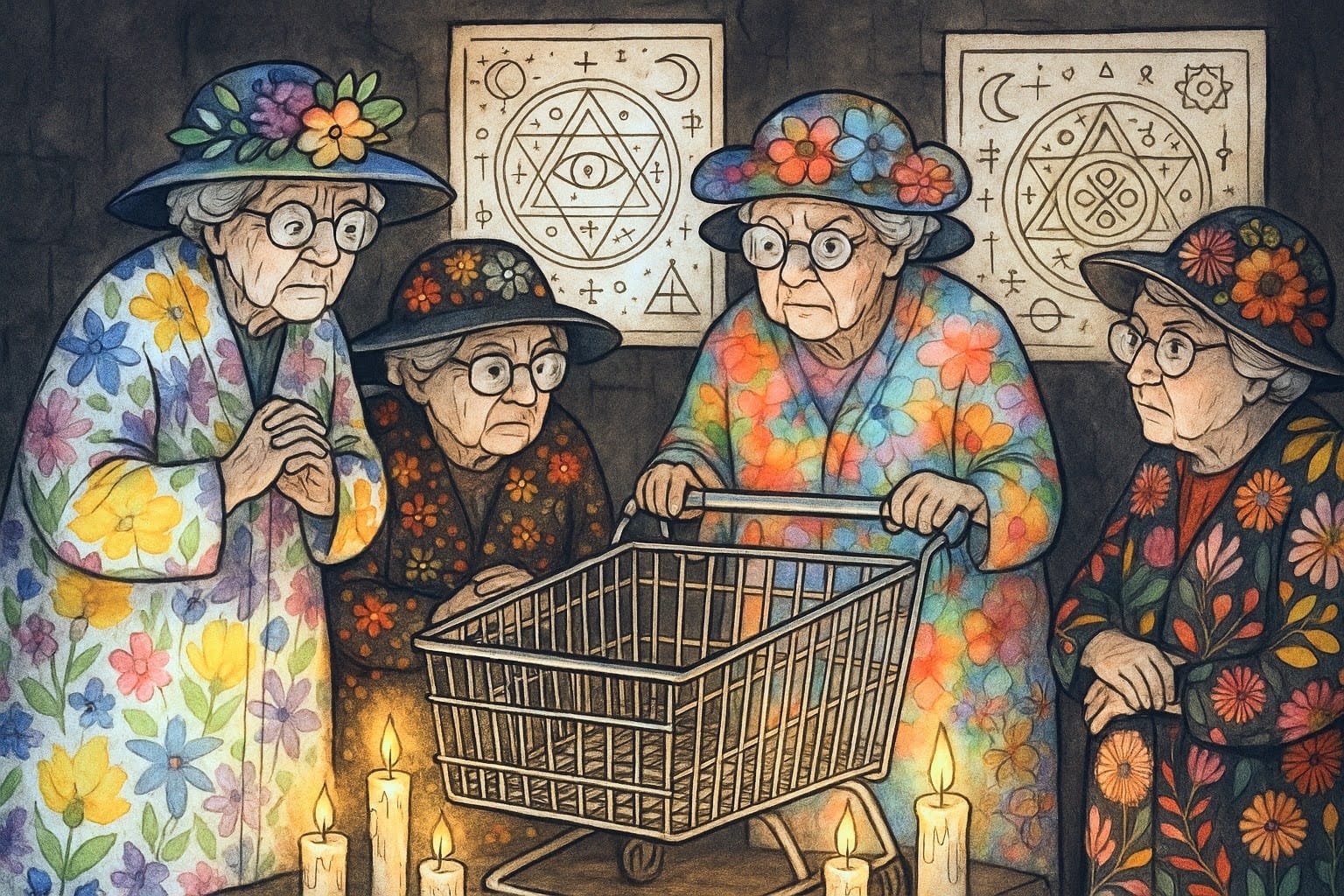The Revolution Will Be Hand-Knitted: Meet the Trolley Magi
Tabletop RPGs often cast resistance fighters as young heroes—chosen ones with swords and spells. We don't imagine Maureen from Flat 3B, who remembers when the miners had power, The Clash fought the law (and the law won), and uses her shopping trolley to disrupt surveillance grids. But maybe we should.
Trolley Magi vs The Panopticon of Albion fundamentally reimagines who gets to be powerful in our stories. Instead of children discovering ancient prophecies, we have pensioners who've already survived multiple apocalypses—the miners' strike, poll tax riots, decades of austerity—and emerged with hard-won wisdom about how power actually works: in the community and through the ley-lines that run beneath. These aren't harmless old dears pottering about with their shopping; they're the keepers of institutional memory that every successful resistance movement depends upon.

The Real Magic of Community Anchors
The game recognizes something profound: in every community facing gentrification, surveillance, or "regeneration," there are people—usually older women—who hold everything together through sheer force of will and accumulated social capital. They know everyone's history, maintain the informal networks that actually get things done, and remember when things were different. They're the ones who notice when the new CCTV cameras appear, when the bus routes change, when the corner shop that's been there forty years suddenly can't afford rent.
In Trolley Magi, this community knowledge becomes literal power. The gossip network moves faster than fiber optic cables and carries emotional resonance that algorithms can't parse. Memory becomes a living spiritual repository where past struggles transform into ancestor spirits offering guidance. The shopping trolleys aren't just random obstacles—they're a deliberate mystical infrastructure that creates dead zones in surveillance grids when properly positioned.
This isn't metaphorical. It's mechanical. When your Memory-Keeper invokes forgotten solidarity, the community gains actual strength. When your Network-Weaver coordinates collective action, it happens across neighborhoods instantly. The game makes explicit what community organizers have always known: the real power isn't in youth or physical strength, but in knowing who needs what, who can be trusted, and how systems actually function versus how they claim to function.
Bureaucratic Horror as Game Mechanic
Where other games might have dragons or demons as antagonists, Trolley Magi presents Efficiency Consultants armed with KPIs, Smart City Planners who want to replace human connection with apps, and Regeneration Specialists who promise improvement while delivering displacement. The horror isn't supernatural—it's systemic.
The game's Community Resilience Meter doesn't track monster attention but bureaucratic scrutiny. Fail too publicly and you don't face ancient curses but planning committees, efficiency reviews, and "modernization programs" that promise to make everything better while making everything worse. The Memory Tax mechanic positions collective memory as the price for voctory, representing how struggle knowledge gets lost even in success, how each generation must rediscover fights their predecessors already won.
Why Older Women? Why Now?
There's something radically subversive about making elderly women the protagonists of a resistance story. Society renders older women invisible, especially working-class women, especially those without institutional power. But that invisibility becomes a superpower when you're trying to resist surveillance capitalism. Who's going to suspect the little old lady with her shopping trolley of being a mystical saboteur?
More importantly, these characters carry something younger rebels often lack: perspective. They've seen multiple systems promise salvation and deliver exploitation. They remember when public services actually served the public, when councils built homes instead of selling assets, when communities had power beyond consumer choice. This isn't nostalgia—it's evidence that alternatives existed and can exist again.
The game arrives at a moment when surveillance has been normalized to an extent that would have seemed dystopian just decades ago. We carry tracking devices voluntarily, submit to facial recognition for convenience, and accept that every interaction should generate data for someone's profit. The trolley magi remember when none of this was normal, and their refusal to accept it as inevitable becomes a form of magic itself.
Playing Toward Hope
Despite its angry energy and political edge, Trolley Magi ultimately tells stories of hope. Every spell cast, every surveillance camera hexed, every community space defended represents the possibility that ordinary people can resist extraordinary systems. The game insists that accumulated wisdom, stubborn solidarity, and strategic placement of shopping trolleys can stand against algorithmic optimization of human life.
These aren't power fantasies about individual heroes saving the world. They're stories about communities saving themselves, one planning objection, one disabled camera, one protected corner shop at a time. The revolution isn't a dramatic confrontation—it's your nan and her mates refusing to let their world be optimized away.
We feel that this is a subversive tale that's long overdue to be told.
Trolley Magi vs. The Panopticon of Albion is available as a free download. You'll need two six-sided dice, a couple of friends, and about 45 minutes to recount the adventures of the most invisible and most powerful figures of the council estate.